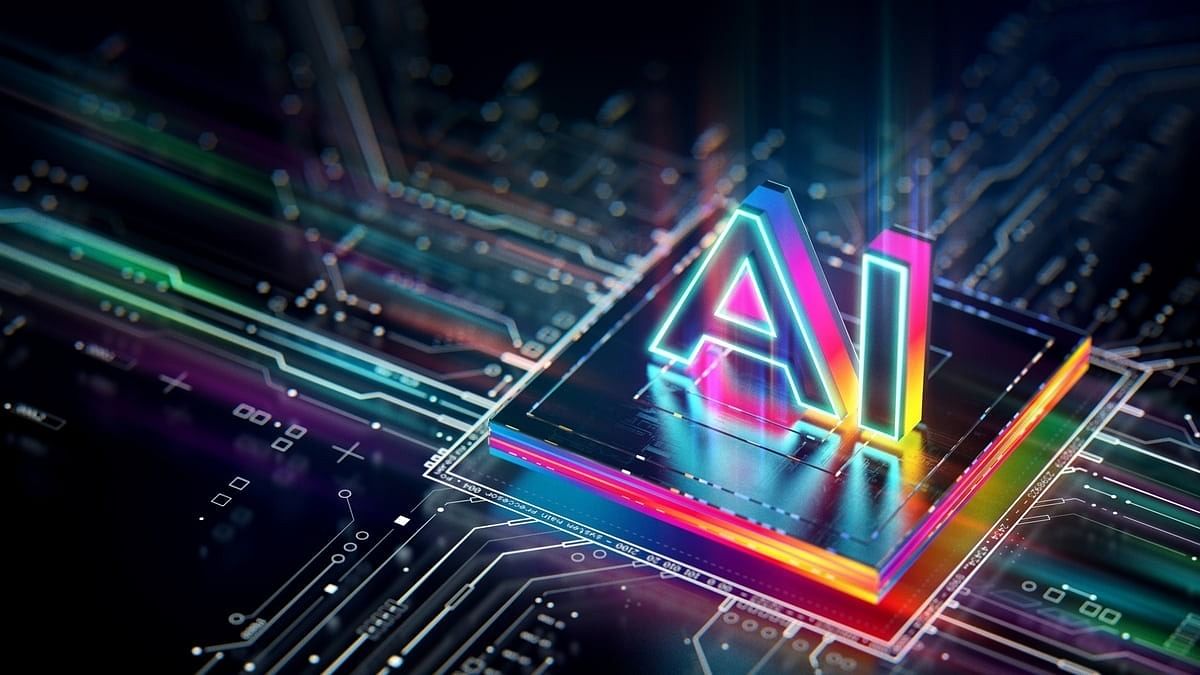
Representative image of artificial intelligence.
Credit: iStock Photo
Bengaluru: In what could be a major step towards offering precision treatment for neuropsychiatric disorders, researchers at Bengaluru's Nimhans have demonstrated the benefits of using a tailored dose of electric current to stimulate activity in specific regions of the brain using a software they developed.
The method being developed at the National Institute of Mental Health and Neurosciences "is a perfect example of AI meeting medicine", said Dr Sagarika Bhattacharjee one of the researchers spearheading the initiative that is being funded by the Centre's Department of Biotechnology.
Dr Bhattacharjee from the Department of Neurophysiology along with Dr P T Sivakumar, professor and head, Geriatric Psychiatry Unit, Nimhans, are conducting a clinical trial on personalised transcranial direct current stimulation (tDCS) for patients with the language variant subtype of dementia.
The tDCS is a noninvasive brain stimulation technique using a low electrical current to influence neural activity.
The AI-powered software that is at the heart of this unique approach was developed by Dr Bhattacharjee and Dr Rajan Kashyap, an AI expert from the Department of Neuroimaging and Interventional Radiology, Nimhans.
What's special about the software is that it calculates personalised treatment parameters for each patient based on their brain size and shape as shown in their magnetic resonance imaging (MRI) scans.
Besides identifying the exact dose required for each patient, the software also highlights specific regions of interest (ROIs) in the brain that need to be targeted for different disorders.
Once the parameters are known, clinicians adjust the tDCS machine to deliver low doses of current that stimulate the areas of the brain impaired by the disorder. Only a few institutes worldwide are capable of doing this, Dr Bhattacharjee told DH.
The trial used MRI scans to simulate tDCS treatment for 50 people with dementia, 25 people with depression and 25 healthy individuals. The electric current stimulation was targeted at the dorsal and ventral pathways in the brain supporting language processing. Preliminary results show significant benefits, including patients showing improvement in daily activities.
The trial is part of a longitudinal study that will go on till 2027 in the Clinical Neurophysiology and Neuromodulation Lab, hosted by Prof Kaviraja Udupa.
According to Dr Bhattacharjee, dementia patients, who often lose memory and language skills due to brain cell or neural connection loss, are expected to benefit greatly from the findings. Interestingly, patients experience no significant discomfort or side-effects during stimulation, she told DH.
A manuscript by the team has been accepted for publication in the peer-reviewed Brain Sciences journal.
The long-term goal, Dr Bhattacharjee noted, is to make this treatment available for patients at their homes.
Dr Ganesan Venkatasubramanian, professor of psychiatry, Nimhans, is collaborating with the Defence Bioengineering and Electromedical Laboratory (DEBEL), a Defence Research and Development Organisation (DRDO) lab in Bengaluru, to develop affordable transcranial electrical stimulation devices, to make this treatment more widely available in India, she said.
Treatment for other disorders
The potential outcomes of personalised tDCS include modulating the brain's electrical activity, strengthening connections between different brain areas, and possibly aiding the formation of new white matter tracts.
Previous studies treated all patients with the same parameters, but the shift to personalised, AI-based treatment for neuropsychiatric disorders will greatly benefit the field, Dr Bhattacharjee said. The technology could be applied in the treatment of other disorders, such as stroke, Parkinson’s disease, depression, schizophrenia, and obsessive-compulsive disorder.